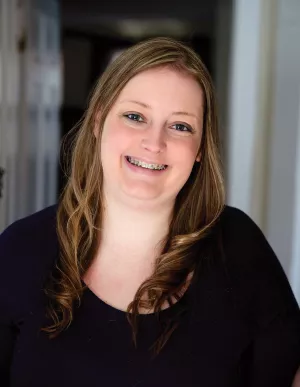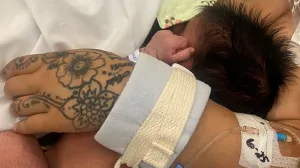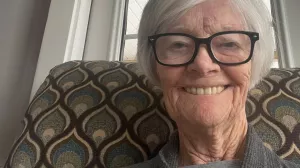
Rapaglia, 28, from Nashua, NH, suffered a dislocated knee cap requiring surgery that would limit her mobility, so she decided to recover at her mother’s Chelmsford home.
Rapaglia admits she didn’t move around much those first days after surgery, and on March 1, two days after her surgery, Rapaglia was suddenly feeling short of breath. Her mother, LeeAnn Harmer, a career nurse, had just arrived home that afternoon and was going to help her into the shower, but Rapaglia was too weak. She collapsed on the couch, struggling to breathe and talk, and her mother called 911.
What they didn’t know was that Rapaglia was suffering from a life-threatening pulmonary embolism (PE). A blood clot had left her surgical site and lodged in the pulmonary artery cutting off the blood supply to her lungs.
“I got wheeled into the hospital, saw all the lights, all the doctors and just remember them telling me to chew baby aspirin,” she says.
Rapaglia was intubated and a CT scan confirmed she had a large PE. The Pulmonary Embolism Response Team (PERT) was activated, where Dr. Omar Ali, an interventional cardiologist and a team of physicians and support staff consulted on her case to decide how they were going to try and save her life.
“She was in really rough shape, and lucky her mom was with her to call 911,” said Dr. Ali. “The right ventricle of her heart was enlarged and dysfunctional, and she was in a state of cardiogenic shock. Her blood pressure was very low and her organs were shutting down, including her liver and kidneys.”
To dissolve dangerous clots, the classic treatment is a medicine called tPA, but large clots like Rapaglia’s can be difficult to break up quickly. For these cases, Dr. Ali has access to a new clot-busting technology that uses sound waves to create small holes in the clot, helping the tPA penetrate the clot to get blood flowing more quickly.
Rapaglia’s mother says the care team at Lowell General Hospital that saved her daughter’s life was “incredible.” “They had every doctor they needed, "she says. “All of them were so kind, and more than willing to step up and explain everything.”
Rapaglia just remembers waking up in the Intensive Care Unit with a tube in her mouth. She was alive and stabilized, but the PE had caused her body to start shutting down.
“When I woke up I was so weak,” she says. “It feels like you are starting life over again because you have to relearn to do everything.”
She spent a week in the Intensive Care Unit where she quickly began to regain her strength. Now, just a short month later, her follow-up appointment with Dr. Ali showed all heart function has returned to normal, and he expects her to make a full recovery and live a normal active life.
Rapaglia knows that had her mother not been there, things could have turned out very differently.
She’ll continue to recover at her mother’s house with her cat, Maggie, and looks forward to getting back to her job in finance and spending time with her friends.
After what she says was a rough year in her life, she says the frightening experience was a wake-up call.
“Almost dying definitely changed my perspective on life,” she says. “I had been down on myself, thinking it would never get better. But now I’m looking forward to living life to the fullest. I didn’t die for a reason. There must be a reason. Things will get better.”

